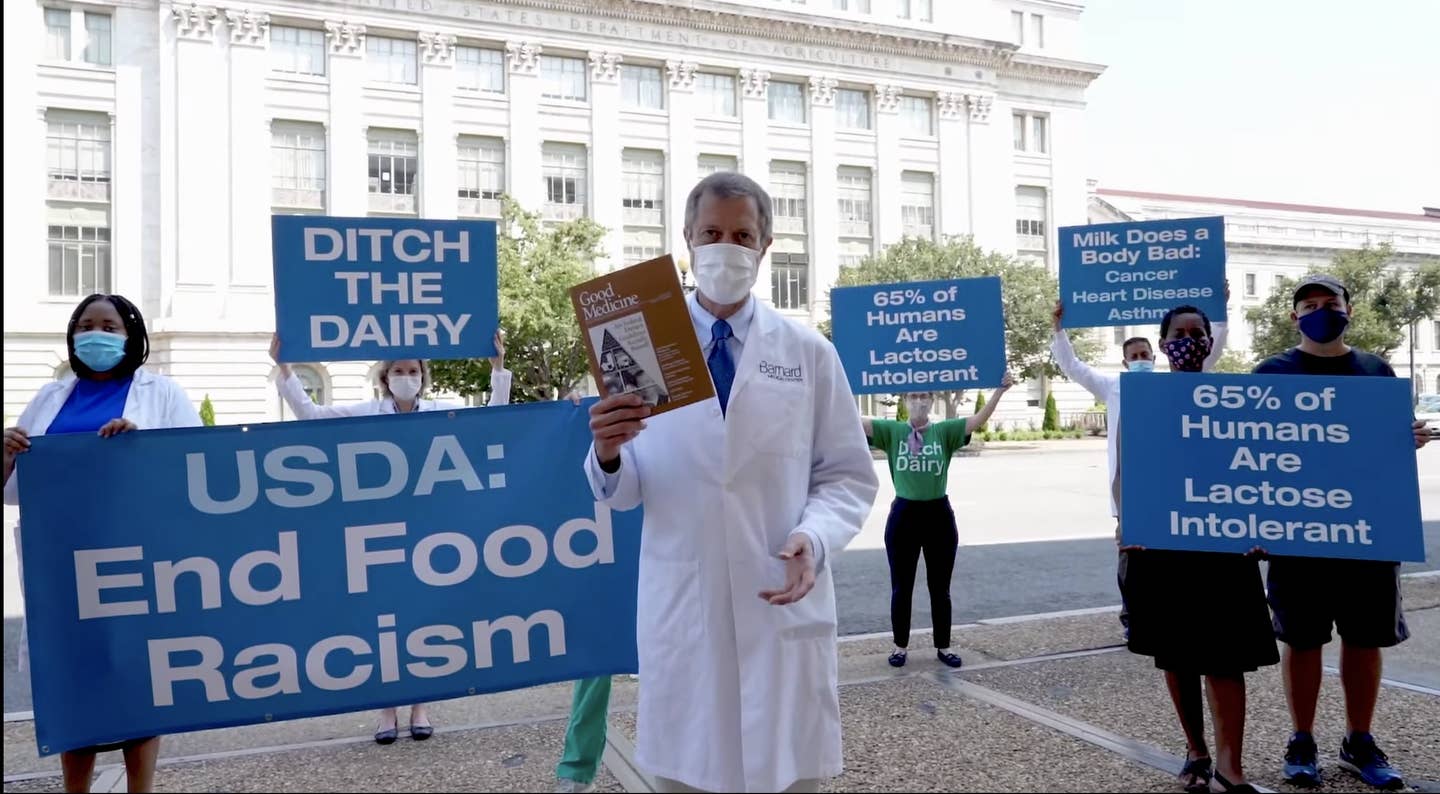
Doctors Protest Outside USDA, Warn the Public Dairy Increases Risk of Some Cancers
Doctors want the USDA to urge Americans to "ditch dairy" when it releases the new dietary guidelines later this year, saying that dairy is tied to heart disease, breast cancer and prostate cancer, due to the saturated fat in whole milk, cream, yogurt and cheese, and traces of estrogen that pass from cows to humans. The question is, even if you're not going fully plant-based, should you try to ditch the dairy? Their answer: With the plant-based alternatives out there, there's no need to ingest cows' milk.
In a release on the Physicians Committee for Responsible Medicine (PCRM), a video shows doctors protesting outside of the USDA, holding up signs that say "End Food Racism" and "Ditch the Dairy" as they attempt to get the attention of the nation's top regulatory agents who are rewriting the guidelines, as they do every five years.
The Beet covered this report when it first came out in July and praised it for recommending that the American diet include more plant-based foods and less sugar. The fact that it recommends dairy is the reason the doctors felt the need to protest, since they believe that dairy contributes to obesity, diabetes, heart disease and hormonal cancers. We have also covered the cheese-cancer connection, which is scientifically backed up by studies and reported by Dr. Neal Barnard, director of the Physicians Committee for Responsible Medicine. Barnard wants cheese to carry labels that warn the public that eating cheese can increase their risk of breast cancer, and told us that it can also boost the risk of prostate cancer.
Protesting Dairy to Let the Public Know Milk and Cheese Increase Risks of Disease
The doctors and health care workers want the public to know that a scientific report recently released from the Dietary Guidelines Advisory Committee's (DGAC) fails to address the health risks of consuming two to three servings of dairy a day, including the saturated fat that raises the risk of heart disease and diabetes. The Physicians Committee for Responsible Medicine (PCRM) has also petitioned to get warning labels placed on cheese, asserting that the trace amounts of estrogen (passed from lactating cows) that is found in cheese is enough to increase the risk of hormonal cancers like breast and prostate.
The controversial report will be used by the USDA and the Department of Health and Human Services (HHS) to develop the 2020-2025 Dietary Guidelines for Americans, which many doctors are urging to not include dairy and reduce the amount of red meat that Americans are told to eat, for the sake of their health and sustainability.
The report to the USDA fails to let the public know that dairy can be dangerous
The good news in the report is that it recommends that Americans should consume a diet rich in plant-based foods instead of saturated fat-laden red and processed meat, but the report failed to warn against dairy products, which are the leading source of saturated fat in the American diet. The specific recommendation that is coming under fire in the report is this: "Two to three cups of total Dairy foods are recommended for consumption each day; the recommendation is three cups for most age-sex groups, regardless of activity level."
The Physician's Committee for Responsible Medicine, which supports eating a mostly plant-based diet for health, has told the public over and over that the saturated fat in dairy is associated with type 2 diabetes and heart disease, and the report "fails to address many other health conditions linked to dairy products."
For a full list of the best plant-based milks that contain protein, calcium and no or little saturated fat, see The Beet's review of the Best Plant-Based Milk to Drink today.
More From The Beet






